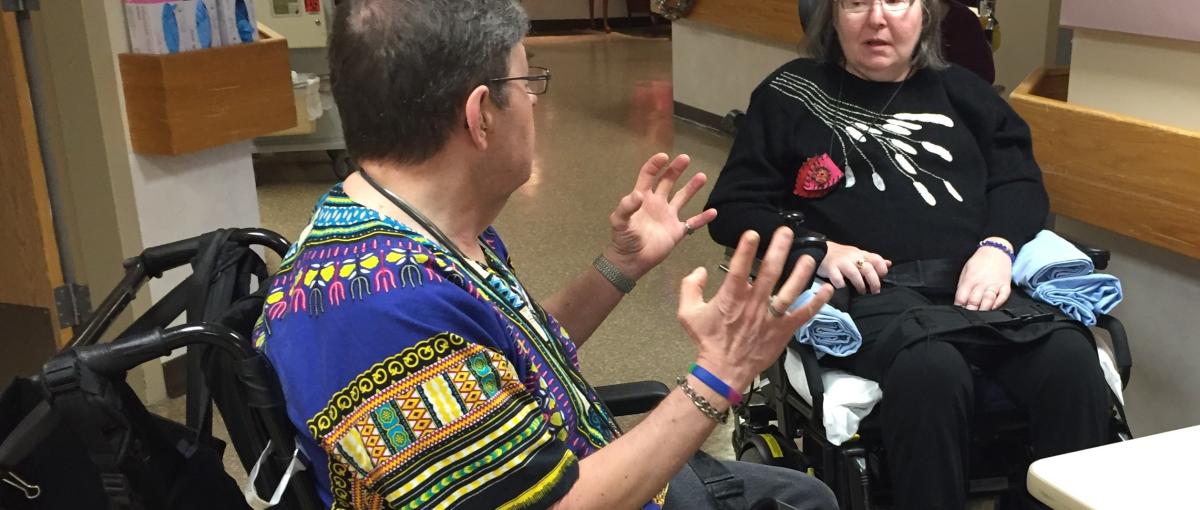Councils make a difference for those in care
Toolkit makes it easier for resident and family councils to improve quality of life

May 2, 2018
By Lisa Brunelle, Communications advisor, Covenant Health
Shawn McCrieght wanted to give residents in care a voice.
The 57-year-old had ideas about how to make positive change for his fellow residents in care at the Edmonton General Continuing Care Centre, but he lacked the tools to bring them to life.
That began to change when the Edmonton General participated in a pilot for The Alberta Continuing Care Resident & Family Council Toolkit, which is designed to give family members and residents a voice to improve residents’ quality of life and care. The toolkit proved to be a significant help in overhauling their existing council, says Shawn.
Following the pilot in spring 2017, the Edmonton General has been restructuring its resident and family councils to ensure residents have a stronger say.
“I participated in the old council and wasn’t very happy with the system. Nothing was getting done. I spoke to other residents, and they said they felt like they weren’t being heard and stopped attending,” says Shawn, current chair of the revamped resident council.
Shawn says the toolkit helped the Edmonton General’s resident council focus on larger group concepts, such as ensuring residents receive information including morning messages. It’s also given them ideas about ways to make council meetings more effective.
“I’ve asked residents to bring an idea to solve any challenge they bring to the council,” says Shawn. “More people are coming to the meetings, and we’re having real discussions.”
The resident council and Edmonton General‘s administration are working together to help residents find their voices and identify projects that are important to them.
On April 1, 2018, Alberta’s Resident and Family Councils Act came into effect. This act requires all licensed supportive living and long-term care facilities to notify residents of their rights to establish self-governing councils. In Alberta, 70 per cent of continuing care centres had at least one of the councils—residents, family, and residents and family—before the legislation was passed.
Prior to the toolkit, the resident and family council at the Edmonton General was not effective, says Jo Ann Molloy, Site Administrator. “We had very few family members participating. And too often the topics were specific to a loved one’s concerns, which should be addressed at the unit level. Instead, council meetings are for making changes that affect many residents, such as asking for a lower grade on a wheelchair ramp.”
The toolkit, which became available in the fall of 2017, is designed to help different types of councils. It’s available on Covenant Health’s Network of Excellence in Seniors' Health and Wellness web page.
“Without oversimplifying it, the toolkit is almost like a cookbook. It gives you a lot of principles about why you should do certain things. Then you tweak the tools a bit to make them work for your site,” says Jo Ann. “With the toolkit you just need to have the will and courage to make the changes.”
Edmonton General residents used the toolkit from the pilot to create a separate resident council where they elected a resident chair and co-chair and developed terms of reference. “These are significant accomplishments,” says Jo Ann. “These are major changes and set the council up to be successful as it moves forward.”
The Edmonton General also has a family council. “We learned it made sense to have separate councils for residents and families. This allows both groups to feel more comfortable raising their concerns,” says Jo Ann.
Shawn says the resident council is seeing more involvement, a sure sign that people feel it’s more effective. They meet monthly and have talked about a range of topics, including potential education sessions for residents and recreation opportunities they can create for themselves, like movie nights.
The benefit of collaboration among care centre councils was highlighted during the pilot. As part of the pilot, phone meetings were held for the nine participating continuing care sites. During the phone meetings, people shared successes and challenges, and asked questions. In May 2018, the continuing care sites in Covenant Health will begin having regular networking meetings.